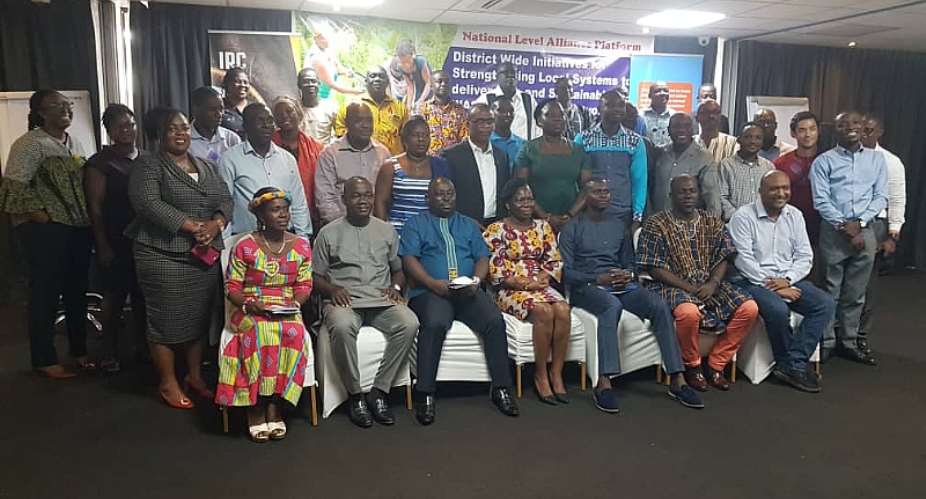National Learning Exchange on Strengthening Local Governance Government Systems to deliver safe and sustainable WASH services have indicated that the water sector is improving and it is possible to attain 100 percent coverage of safe drinking water delivery by 2030.
This was made at a day workshop organized by IRC, WaterAid, Water4 and the Hunger Project in collaboration with focal District Assemblies. The implementing District Assemblies present are Asutifi North, Bongo, and Wassa East at Golden Tulip Hotel in Accra.
According to Vida Duti (Mrs), IRC Ghana Country Director, the workshop focusses on learning exchanges on district-wide initiatives on building and strengthening strong local systems to deliver safe sustainable water, sanitation and hygiene services for everyone.
“The workshop will also help exchange experiences and lessons with like-minded district-based initiatives; generate clear and strong recommendations for strengthening local systems for improved service delivery towards achieving the WASH Sustainable Development Goals."
Mr Wilson Arthur, Wassa District Chief Executive, said it has become clear that public service is no longer the preserve of government and called for partnership with the private sector, adding that “in this case, the burden will be on government to build capacity and develop skills of public officer to be able to monitor the system”.
On his part, Mr. Peter Ayamga Ayimbisa, the Bongo District Chief Executive, said the District has achieved 85 percent coverage in water from the previous 45 percent and expressed the hope that they would be able to achieve 100 percent coverage by 2030.
“Even before 30230, we are on the verge to achieve the target in the area. Now we have available water and toilet facilities and almost every school in the district has water and toilet facilities.” He, therefore, commended WaterAid for the support that led to the success story. Pointed out that more women are now delivering at the health center due to the availability of water and proper care.
According to him, the challenge facing the district was that there are lots of fluoride in the groundwater and urged partners to come together to assist them to solve the problem. He added that they have so far trained 11 communities to construct their own toilet facilities. Out of the number, five communities made up of 108 households constructed their own toilet facilities.
Akua Owusu Asamoah (Mrs), Deputy Head, Fiscal Decentralisation Unit of Ministry of Finance, hinted that many district assemblies are doing things that are not reflected on the National Plan and urged them to feed the National Development Planning Commission with all that they do.
She stressed that there is also the need for district assemblies to start budgeting for their Internally Generated Funds to support the projects across the districts.





 Minority will expose the beneficial owners of SML, recover funds paid to company...
Minority will expose the beneficial owners of SML, recover funds paid to company...
 Prof. Opoku-Agyemang has ‘decapitated’ the NPP’s strategies; don’t take them ser...
Prof. Opoku-Agyemang has ‘decapitated’ the NPP’s strategies; don’t take them ser...
 Abubakar Tahiru: Ghanaian environmental activist sets world record by hugging 1,...
Abubakar Tahiru: Ghanaian environmental activist sets world record by hugging 1,...
 Prof. Naana Opoku-Agyemang will serve you with dignity, courage, and integrity a...
Prof. Naana Opoku-Agyemang will serve you with dignity, courage, and integrity a...
 Rectify salary anomalies to reduce tension and possible strike action in public ...
Rectify salary anomalies to reduce tension and possible strike action in public ...
 Stop all projects and fix ‘dumsor’ — Professor Charles Marfo to Akufo-Addo
Stop all projects and fix ‘dumsor’ — Professor Charles Marfo to Akufo-Addo
 Blue and white painted schools will attract dirt shortly – Kofi Asare
Blue and white painted schools will attract dirt shortly – Kofi Asare
 I endorse cost-sharing for free SHS, we should prioritise to know who can pay - ...
I endorse cost-sharing for free SHS, we should prioritise to know who can pay - ...
 See the four arsonists who petrol-bombed Labone-based CMG
See the four arsonists who petrol-bombed Labone-based CMG
 Mahama coming back because Akufo-Addo has failed, he hasn't performed more than ...
Mahama coming back because Akufo-Addo has failed, he hasn't performed more than ...
